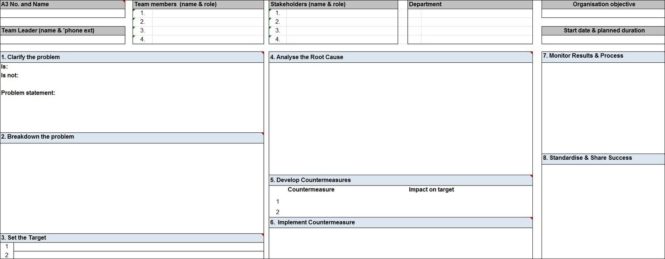As the name suggests it is a single-page report that summarises a full problem analysis. This leads to uncovering non-value adding activities for elimination. Established by Toyota these reports have become more and more complex over time using accompanying graphics to support the user.
Today they are a standard method for summarising problem-solving exercises, status reports, and planning exercises like value-stream mapping.
An A3 report is a way of structuring and sharing knowledge. By enabling teams and their members to practice scientific thinking as a way of discovering and learning together. The tool promises immediate benefits by helping people structure and designs more effective approaches to problems (framing them insolvable ways, taking a data-based approach, using root-cause-analysis to find the point of origin for problems (gaps), encouraging careful problem analysis over quick abstract “solutions,” and so forth).


The strength of this report is that it gives an overview of your organisation’s problems all in one place. This helps users think through their entire process in great depth. Rather than attempting to find the best solution as soon as possible A3 thinking requires careful framing of a problem and patient analysis. This helps users consider how best to structure their solution and how to go about meaningful dialogue with people who actually touch the issue.
Learn how to use the report for problem-solving in our guide to process improvement tools.
8-steps to complete an A3 report
Generally, A3 report templates follow these 8 steps to solve problems:
Explore more about different process improvement terms in our BPM Glossary.
Robotic Process Automation (RPA): Streamlining Business Processes What is Robotic Process Automation (RPA) in Business…
What is Benchmarking? Benchmarking is a strategic management tool employed in Business Process Management (BPM)…
What is SCRUM? SCRUM is an agile framework for project management, emphasizing iterative progress, collaboration,…
What is KANBAN? Kanban is a visual project management method originating from the Toyota Production…
What is DMADV? DMADV (Define, Measure, Analyze, Design, Verify) Discover the structured Six Sigma methodology…